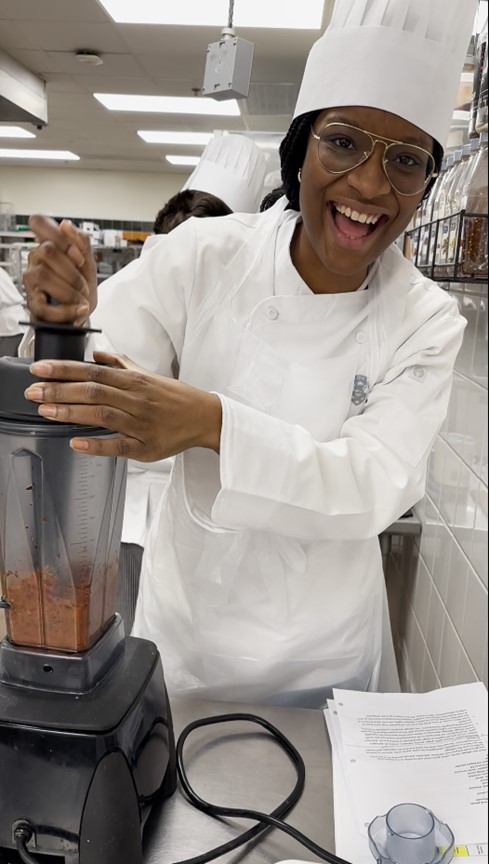Dana Norwood, 2023
Spring Break at JWU: Student Experiences

Passion: The Secret Ingredient
The Friedman School of Nutrition Science and Policy is the only nutrition school in the country and one of, if not the foremost, nutrition school in the world. People come from all walks of life at every corner of the earth to study from the world’s greatest minds on nutrition science and nutrition policy. And even in the face of nutrition excellence, Johnson and Wales has bridged the gap between nutrition science and culinary arts in the most beautiful way.
Watching these culinary and pastry students artfully command their spaces in the kitchen while humbly recognizing the nuances of the ingredients in their dishes has been the most powerful example of bridging this gap between the food we produce and how we consume it. Every single chef, student, and faculty member that I had the honor and privilege of meeting exemplified excellence and passion for feeding people, and feeding them well.
Now with that being said, can I be completely honest and say that I have never liked cooking? Not even a little. Growing up with a sister that loves to bake and two more that love to cook, the kitchen was already full. And with a palate that would rather eat to live than live to eat, I simply needed just enough food to get through the day. But something has shifted in me since this immersive culinary experience. In one week I helped bake/prepare 12 types of bread (having never made one before in my very short life). I tasted intricate wines from a few different corners of the earth. I learned pastry techniques on how to create beautifully plated desserts I had never even heard of. I listened to senior students as they curated a complete menu of therapeutic cuisine for individuals on a heart healthy diet post medical intervention. I tried simple healthy dessert recipes that tasted far more delicious than some of the most decadent and complex ones I have come across in my life. I was able to hear the “why” from former doctors, soldiers, and current dieticians and artists who had made their way into the hallowed walls of Johnson and Wales. Throughout it all, one thing quickly became clear: Food tastes so much sweeter, stronger, and potent when you know where it comes from. When you know the passion that went into its delivery on your plate.
This is not a particularly foreign or even new principle; that passion is infectious and contagious… and apparently quite flavourful. But it was refreshing to apply it to something I had not thought to apply it to before. My passion for people’s right to nutritious food no longer stops at access, or even knowledge. It does not end with equity and especially empowerment of all people’s right to feed themselves well. It now includes the joyful experience of using ingredients that mean something to you to make something that nourishes your mind, body, and soul. I am eternally grateful to the Food and Nutrition Innovation Institute for considering me for this experience.
Almost three months later, I am still in awe of all that has shifted in me since this experience. For years I have eaten with a purpose: Fill my body with its necessary nutrients. I am now increasingly driven to cook with greater passion about my ingredients. To eat with greater joy and ever-present thankfulness for the hands that have prepared my food at every step of the process that led to its being on my plate. To remember my “why” when I buy my groceries, and especially remember my “training” when I cut my vegetables.